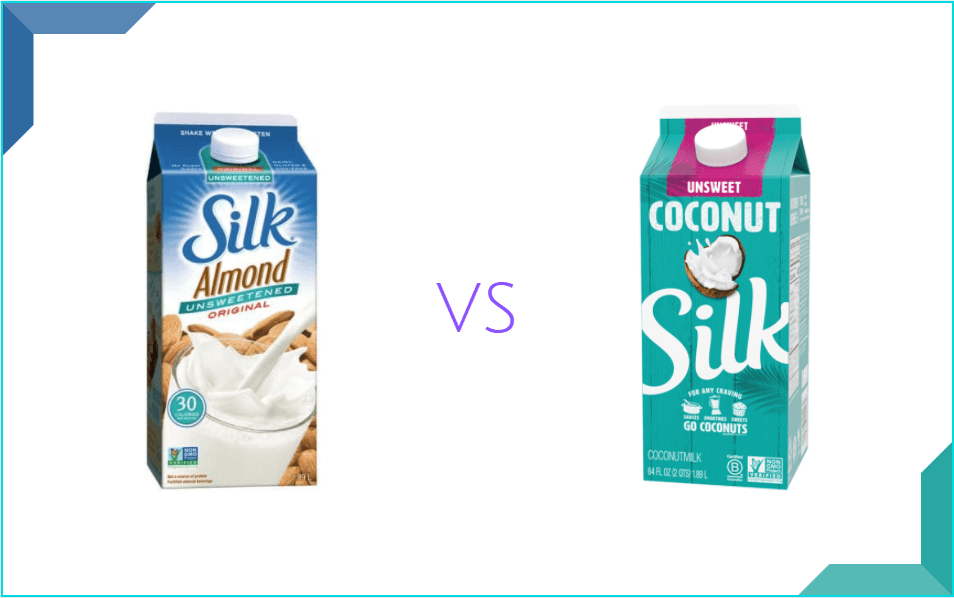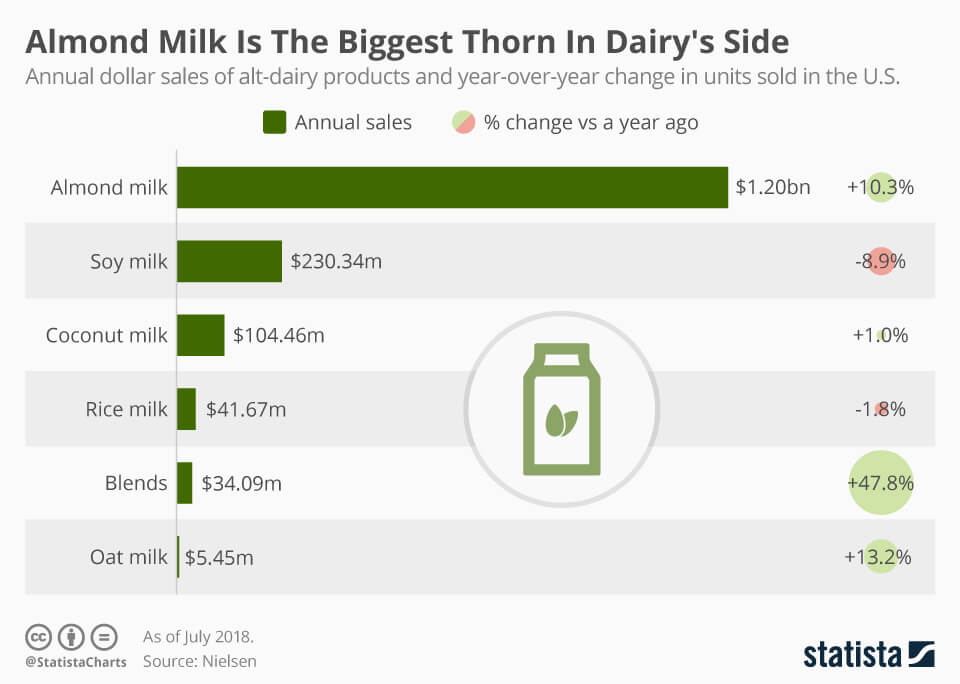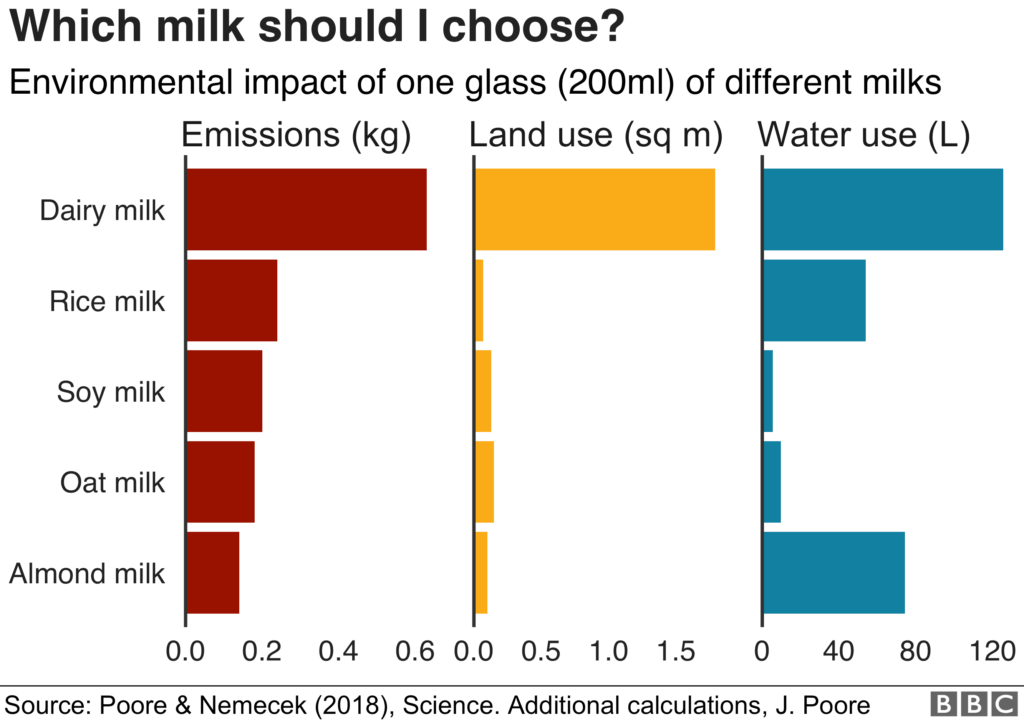Coconut milk and almond milk are two of the most popular non-dairy types of milks that have more recently become popular.
They’re great alternatives to dairy for vegans, environmentalists, or just people looking to eat a bit healthier.
There are many types of coconut milk (canned, boxed, carton), which can have drastically different taste, texture, and nutrition. To make a fair comparison, we’ll be looking at almond and coconut milks made by Silk in refrigerated cartons, by far the most popular brand.
Table of Contents
Calories and Macros: Coconut Milk vs Almond Milk

Let’s start by looking at the amount of calories and fat in each type of milk:
| Silk Unsweetened Almond Milk | Silk Unsweetened Coconut Milk | |
|---|---|---|
| Serving Size | 1 Cup | 1 Cup |
| Calories (kcal) | 30 | 70 |
| Fat (g) | 2.5 | 4.0 |
| Saturated fat (g) | 0 | 3.0 |
| Carbohydrates (g) | 1 | 1 |
| Sugar (g) | 0 | 0 |
| Protein (g) | 1 | 0 |
Almond milk is quite a bit lower in calories than coconut milk. This is mainly due to having less fat in it (and a small amount of protein instead).
Both are relatively low in protein compared to other vegan milks.
For comparison, dairy milk has 103 calories in a cup of 1% milk, and 124 calories in a cup of 2%.
Which is Healthier: Coconut Milk or Almond Milk?
Both types of plant milks are relatively low in calories, and there’s no obvious unhealthy macronutrients like trans fats or added sugar.
So let’s go a little deeper by looking at the micronutrients in almond and coconut milk. We’ll look at the percent of daily value in 1 cup of each:
| Silk Unsweetened Almond Milk | Silk Unsweetened Coconut Milk | |
|---|---|---|
| Vitamin A | 15% | 20% |
| Vitamin B12 | 0% | 35% |
| Vitamin D | 10% | 10% |
| Vitamin E | 25% | 20% |
| Calcium | 30% | 35% |
| Iron | 2% | 2% |
| Magnesium | 2% | 0% |
| Potassium | 2% | 6% |
The only big difference is that vitamin B12 is added to Silk’s coconut milk, but not their almond milk. Other than that, the profiles are almost identical.
This will differ by brand, but not by that much.
Of those nutrients, there’s really only a significant amount of the 4 vitamins in them plus calcium. While vitamins are easy to get for health conscious people, calcium isn’t always easy to get, so that’s something that many people can benefit from.
Potential Negative Health Effects of Coconut and Almond Milk
So far, both almond and coconut milk seem healthy enough from a quick look.
There are a few other things that we might want to consider.
For almond milk, the main concern is:
- Omega 6 fats – Almonds have one of the worst omega 3 to 6 fat ratio of any nut. Having some omega 6 fats in your diet is fine, but having too much (which most people do) can lead to inflammation.
For coconut milk, the main concern is:
- Is saturated fat in coconut milk bad? – Heart disease still isn’t fully understood, but the general consensus these days is that a higher total cholesterol is bad, and saturated fat raises cholesterol. The saturated fat in coconut (MCTs) raises both LDL and HDL cholesterol. It’s hard to conclude if this is good or bad (and it might be good for some, and bad for others).
These concerns are bigger when it comes to eating coconut and almonds themselves, since there really isn’t much of them left in milk (they essentially get watered down).
There isn’t a significant difference in the nutritional value of coconut milk vs almond milk. Both should be relatively healthy to consume in moderate amounts, however some people may want to avoid coconut milk due to the saturated fat content (if that’s something a doctor recommends in a certain situation).
Which Tastes Better: Coconut Milk or Almond Milk?
There’s a reason that both coconut and almond milk are among the most popular non dairy milks.
Not surprisingly, if you like the taste of almonds, you’ll probably like almond milk. Similarly, coconut milk has a similar flavor to coconut, just not as strong.
Based on non-dairy milk sales, almond milk is the most preferred among the general population.
However, coconut milk makes up a decent portion of sales as well.
Which is Better For the Environment: Coconut Milk or Almond Milk?
Plant based milks are typically bought by environmentally conscious people. While both are way better than dairy for the environment, there is still some impact.
Here’s a brief summary of the potential environmental impacts of both coconut and almond milk:
| Almonds | Coconuts | |
|---|---|---|
| Origin | Mainly grown and shipped from California | Mainly grown and shipped from southeast Asia |
| Water consumption | 3.2 gallons of water per single California almond (in California, which regularly has droughts) | Not a significant issue. |
| Monoculture | High demand is leading to less diversity in crops | High demand is leading to less diversity in crops |
| Bee exploitation | Bees are shipped from all over the United States to pollinate almond trees. There are many negative consequences of this. |
This is a complex topic, and there’s a lot you can read on it. Some people don’t even consider almond products to be vegan, although that’s not the majority opinion.
Overall, coconut milk would be considered the more sustainable and environmentally friendly option. You can also get organic or fair trade coconut milk to ensure that it’s made sustainably.
Coconut Milk vs Almond Milk vs Soy Milk vs Oat Milk
What about other plant based alternatives?
- Soy
- Oat
- Cashew
- Rice
- Etc.
More and more non dairy milks are showing up in grocery stores, which is great.
Without going into too much detail, here’s a quick overview of highlights for each:
- Soy milk – High in protein, on the thicker side for plant milks. There are some concerns over soy deforestation.
- Oat milk – On the thin side (i.e. watery), and more carbohydrates than most alternatives. However, it’s cheap and easy to make yourself, and is arguably the best for the environment.
- Cashew milk – A great almond milk alternative if you like the nutty flavor.
- Rice milk – Not as common, but a good alternative that’s typically low in calories (depending on added sugar).
To wrap things up, here’s a nice graphic that the BBC made of a study’s results on the environmental impact of different milks.
It’s pretty clear that if you’re concerned with the environmental impact of your milk, you can’t really go wrong with plant milk compared to dairy milk.



Dale,
I have just spent about 20minutes reading various articles on your website. This is the best website I have ever encountered on various subjects related to vegan nutrition. I like the fact you also put up bar charts and graphs which help me understand the data. Please consider publishing a book with all this data. I would buy it. Regards.
A book isn’t likely to happen, but I appreciate the kind words Forest.